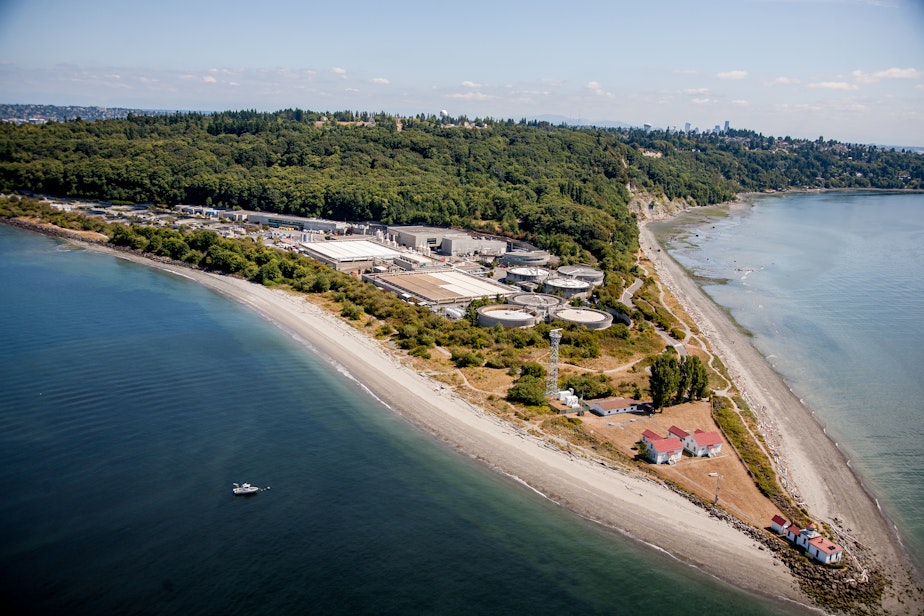After years of sewage spills, King County settles tribal lawsuit, agrees to plant upgrades

In 2017, catastrophic failures at the West Point Treatment Plant in Discovery Park turned into one of the worst infrastructure disasters in the region’s history – sending 30 million gallons of untreated sewage into the Sound.
The Department of Ecology fined King County and ordered improvements.
But smaller spills have continued: In 2018 and 2019 the plant dumped more than six million gallons of untreated or improperly treated sewage into the Puget Sound.
So, the Suquamish Tribe took a big step: In 2020, it announced its intent to sue the county.
On July 19, 2019, the Suquamish Tribe was preparing for its annual tribal canoe journey.
Forty paddlers and hundreds of guests had gathered at the Suquamish reservation on the Kitsap Peninsula. The paddlers had arrived from neighboring tribes across the Pacific Northwest, some traveling almost 300 miles to reach the reservation.
But, as they arrived, the Suquamish Tribe was notified about a problem.
A spill linked to the West Point Treatment Plant in Seattle's Discovery Park was leaking three million gallons of raw or improperly treated sewage into Puget Sound waters.
The tribe took immediate health precautions for the paddlers.
Sponsored
"So we made sure they washed down as they came in off the water," explained Suquamish Chairman Leonard Forsman. Forsman is also president of the Affiliated Tribes of Northwest Indians.
"And it was an example of something that we had been going through over time, with multiple spills and closures," Forsman said.
The tribe felt like they needed to take action.
"We needed to get more attention to the issue," Forsman said. "We've worked with King County in the past on many of these projects. So we knew that they were making efforts, but we just felt like they're falling short and needed to be made aware that we had tired of this."
In 2020, the Suquamish Tribe announced its intent to sue King County over the spills.
Sponsored
That launched a couple years of negotiations. And this week, King County and the Suquamish Tribe settled that impending lawsuit.
The settlement, said Suquamish Ecosystem Program Recovery Manager Tom Ostrom, does three things:
It compensates the tribe $2.5 million for impacts from the sewage spills. And it will cost the county if another spill occurs.
"If any sewage is discharged from West Point's Emergency Bypass, the county will pay the tribe an additional $50,000 penalty to the tribe for each bill event," Ostrom said.
An additional $2.4 million will also go toward supplemental environmental projects to be completed in the next five years. Current projects being considered include restoration of the mouth of Boeing Creek near Shoreline, as well as protection and restoration of shorelines near Elliot Bay.
Sponsored
The settlement also creates an enforceable schedule for infrastructure upgrades needed at the West Point Treatment Plant.
"And these infrastructure upgrades would reduce or eliminate future untreated sewage spills, particularly at West Point Emergency Bypass," Ostrom said. If the county misses a deadline for the upgrades, it's required to pay a $40,000 penalty, and $10,000 for each additional month of delay after that.
In an interview with The Seattle Times, Christie True, director of the county’s Department of Natural Resources and Parks, said the improvements needed had already been recognized by the county, but the tribe’s lawsuit will force set due dates and “methods to hold us accountable.”
When asked why it takes a threatened lawsuit to enforce due dates for necessary repairs, Chairman Forsman noted that the current system is far from perfect.
"The Suquamish Tribe has a duty to its people, and do its culture and traditions to protect our waters. And this is something that was part of our belief system before contact, and it's something that perseveres through our present day," Forsman said. "I think that we have grown accustomed to this role as sentinel for the Sound. Of being the people that have this responsibility to hold other jurisdictions accountable. I wouldn't say it's a great system, but it's one where we have right now."
Sponsored
Forsman also noted that the Suquamish Tribe would continue to do its best to protect Puget Sound, and keep an eye on King County as it begins the upgrades to its wastewater treatment system.





